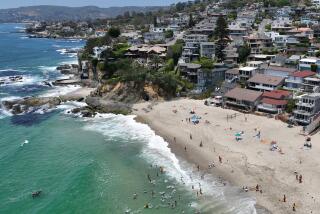Bergeson, State Panel Talk Beach Curfew Compromise : Politics: Senator and Coastal Commission both say deal appears doable. It must balance cities’ safety concerns and agency’s desire for free public access.
- Share via
SACRAMENTO — Breaking the ice in a testy dispute between cities and the state over beach curfews, state Sen. Marian Bergeson met with California Coastal Commission officials Wednesday to seek a compromise that could allow cities to continue the nightly closures.
Although no agreements were reached during the 45-minute meeting at Bergeson’s Capitol office, the Newport Beach Republican and commission officials agreed to meet again in Orange County on Jan. 28 with disgruntled local officials.
“There was a good exchange,” said Bergeson, who has promised to introduce legislation if the matter can’t be resolved through negotiations. “They appeared very willing to work toward a solution or better understanding.”
Peter Douglas, commission executive director, also expressed confidence that an agreement can be reached balancing the concerns of local officials--who are hard-pressed to finance nightly patrols to ensure public safety--and the desires of coastal officials to keep the shoreline open to the public.
“She was very forceful with her defense of home rule and trying to meet public safety needs in a time of strapped budgets,” said Douglas, who attended the meeting with commission Chairman Thomas W. Gwyn. “She understands our concerns about public access. . . . We made the point that these are solvable issues and that it’s not the kind of thing that needs legislation.”
The dispute was sparked after the commission dispatched a letter in October to 73 cities and counties along the state’s 1,100-mile coastline--including four Orange County communities that have imposed curfews this year in fear of late-night crime--indicating that such closures are illegal without state approval. The letter also suggested that state approval of any ongoing closures would not be forthcoming.
City and county officials in Orange County and elsewhere were upset that the commission might try to override their ability to curb shoreline crime by limiting access during late-night hours. Commission officials have historically refused to approve any request to close beaches to the public.
Although state officials said they felt the curfews were illegal under the state Coastal Act, no effort has been made to override the locally approved closures. Douglas has said in the past, however, that each local government might have to apply for a permit in order to keep enforcing the curfews.
Tight budgets, as well as a spate of drunken brawls and a few shootings, prompted the state Department of Parks and Recreation to impose a curfew at state beaches in Orange County last April, rolling back its closing hours from midnight to 10 p.m.
The cities of Huntington Beach, Newport Beach and Seal Beach, which had curfews of 11 p.m. or midnight, promptly followed, fearing that those turned away from the state beaches might just move down the sand.
While those curfews were not challenged, the commission has acted in some cases to thwart stricter restrictions. Long Beach, for instance, had closed its beaches at midnight since the 1950s, but last year when it imposed a tougher curfew--from 10 p.m. to 5 a.m.--the move was rejected by the commission.
In addition to complaints from Bergeson, the commission has been buffeted by criticism from Gov. Pete Wilson, who railed against the state agency at the end of a well-attended press conference last week.
During the meeting Wednesday, Douglas said, “we made it very clear it’s not an issue of public safety or public access--it’s both. . . . I thought it was a very positive meeting. We got the message.”
The Jan. 28 session will take place in Huntington Beach and will include local officials, law enforcement representatives, legislators and members of the Coastal Commission. Douglas said he also plans to discuss curfews during next week’s commission meeting in Santa Barbara. Local officials also will have an opportunity to address the commission during that meeting, he said.
But should no compromise emerge in the coming weeks, Bergeson said, she is ready to introduce a bill restricting the role of the commission when it comes to curfews.
“I don’t quarrel with the fact the public should have access to beaches,” Bergeson said. “The question is, when does that access conflict with public safety? I think local officials are better able than a state agency to make such a determination about something going on in their own back yards.”
Local officials in Orange County were pleased that headway is being made.
Jerry L. Bankston, Seal Beach city manager, said the negotiations are “very welcome news and really puts us as a coastal city in a non-emotional position and better able to deal with this.”
He said the beach city would continue to argue that a local jurisdiction is best capable of assessing police calls, violent incidents at the beach and those affecting beaches in neighboring cities. Police calls for service around the city’s pier area have decreased, Bankston said, in part because of a beach curfew the city imposed last year closing the beaches from 10 p.m. to 4:30 a.m.
“I would hope not to go through a protracted hearing application process just to have our curfew approved,” Bankston said.
In Huntington Beach, Mayor Linda Moulton-Patterson, who is on the 12-member state Coastal Commission, said she interpreted Douglas’ meeting as a positive sign for Orange County coastal cities.
“I really think the commission staff needs to hear about some of our local problems and hear about local control,” Moulton-Patterson said. “If you’re balancing public safety with right to public access, you really need public safety to win out.”
More to Read
Get the L.A. Times Politics newsletter
Deeply reported insights into legislation, politics and policy from Sacramento, Washington and beyond. In your inbox twice per week.
You may occasionally receive promotional content from the Los Angeles Times.










